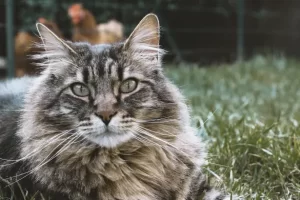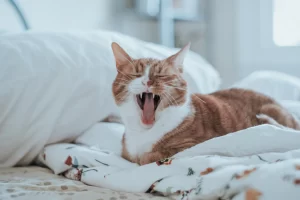Last updated on February 6th, 2023 at 12:28 am

Cats are often linked to night owls since cat meows at night is a very common behavior. However, as a cat owner, this can be annoying as it disrupts your sleep. You might be worried about your furry friend’s well-being due to their vocalizations at night. Read our article to find out the causes for your cat to be meowing at nighttime and several solutions to assist you, and your cat gets a peaceful and pleasant night’s sleep.
#1. Your feline friend needs food
In an attempt to get food, some cats meow whenever you enter the kitchen. Additionally, many cats become very loud as their eating times approach. Don’t give your cat food when it cries if this is your issue. Don’t offer them treats while they meow; wait till they are calm before giving them food. Purchase an automatic feeder that opens at predetermined times if this fails to work, as the cat will now meow at the feeder instead of you.
#2. Your cat might be seeking your attention
Cats do not enjoy being alone as much as some people might believe. Cats will frequently meow to request attention, play, or petting. Stop responding when meows for attention occur if you want to reduce their frequency. Only pay attention to them when they are silent. Look at them or go away if cats begin to meow once more. Don’t disregard your pet, though. Spend time with them daily, grooming, conversing, and playing since a worn-out cat is a calmer animal.
#3. Your cat feels lonely
Consider hiring a pet sitter if your pet spends a lot of time alone during the day to improve their quality of life. Place a bird feeder at a window so they can gaze at it. Food-filled toys for foraging should be left outside. Place a bird feeder at a window so they can stare at it. Food-filled toys for foraging should be left outside. Purchase them a cat condo and switch up the toys you set out for them to play with.
#4. It may be a sign of aging in your older cat
Just like humans are impacted by aging, cats are no exception. Your cat may become confused as they age due to the effects of brain aging. Meowing at night is one of several signs of cognitive dysfunction syndrome, which is directly tied to the impact of aging on a feline’s brain. If your cat experiences nighttime disorientation, a nightlight may occasionally be helpful. Vets can also often recommend drugs that alleviate these symptoms.
#5. Perhaps your cat is uninterested or bored
When a cat meows at night it may be due to boredom or failing to exhaust themselves during the day. Trying to maintain their thoughts engaged and joyful during the day will ensure that they are more exhausted at night and engage in vigorous play before bed. Trying to keep their thoughts engaged and lively during the day will ensure that they are more exhausted at night and engage in active play before bed. Your cat’s nightly meowing may be an act of attention-seeking.
Even though it’s crucial to care for your cat’s demands, repeatedly giving in to their requests for attention could make them more persistent. If this is a problem, try not to cave too frequently. When you have an indoor cat lacking access to an outdoor area, you’ll have to organize lots of time for playtime during the day. If not, they can feel a little left out when you go to bed, which would make your cat yowl at night.
#6. Your cat is stressed
Stressed-out cats frequently become incredibly vocal. Your cat may start talking if there is a new child or pet, a relocation or other alterations to the house, an ailment, or the death of a loved one. Find out what is worrying your pet, then assist them in getting used to the change. Alternatively, you can provide your cat with additional attention to assist them in feeling better.
#7. The yowling sound may be a sign of mating
When cats are yowling at night and exceptionally loud shrieking can be signs of mating, as many have learned from experience. While this is a regular occurrence, we firmly advise that you get your cat spayed, both female and male, as doing so drastically minimize the number of unwanted kittens. Furthermore, it will silence the obnoxious yowling noise.
#8. Outdoor cats could feel confined
There is a significant likelihood that your cat is crying as the result from them feeling trapped if they spend the day outside and are kept inside at night. There is a substantial likelihood that your cat’s crying results from their feeling caged if they spend the day outside and are kept inside at night. Consider adding a cat flap and sending them out at night if it is secure so they may burn off some energy outdoors.
#9. Cats are very active during the night by nature
The fact that cats are typically highly active at specific times of the night may significantly impact why your cat meows at night. It’s a common misconception that felines are nocturnal, although this isn’t entirely accurate. Cats are crepuscular, meaning that dusk and dawn are when they are very active. Even though most cats do adjust to their owners’ routines, your cat might be particularly active in the early morning hours while the rest of the home is still asleep because of their propensity for being crepuscular. Because their intuition tells them that nighttime is the best time to hunt, younger cats are more likely to be active at this time.
#10. Kidney disease/Overactive thyroid
You should see a veterinarian to evaluate your cat’s health if frequently your cat meows at night. It is because in cats, extreme meows, even at night, may indicate kidney disease or overactive thyroid.
Also read: Top 15 Common Cat Health Problems
6 Ways to stop a cat from meowing at night

#1. Before going to bed, empty the litter box
Cats prefer doing their business in a clean, fresh litter box. So, your cat may be whining at night because of a dirty litter box. Try scooping the litter box before bed to ensure that your feline companion has a clean area to relieve himself. In addition to being scooped once or two times a day, your cat’s litter box needs to be thoroughly cleaned using a hygienic, ecologically friendly detergent once a week. Your cat will be happier and more peaceful at night if its litter box is sparkling clean.
Also read: Best Litter Boxes For Cats
#2. Ensure your cat is engaged throughout the day
When your cat meows at night, it could mean that he or she is inactive during the day. For cats, their sleeping time at night will decrease if it takes too many naps during daytime. The secret is to keep your cat as alert and active as possible during the day. A quick and easy approach is to give your cat a food puzzle. This should keep your cat busy and at the same time improve its physical and mental stimulation over mealtimes.
When you have spent most of your day away from home, schedule time in the evening to engage with the cat, they require engagement and company, just as we do. If not, the cat may start meowing during the night when you are attempting to sleep as they feel stressed out, bored, and lonely at night. Cats have a more extended sleep schedule than most pets which is important to note.
#3. Adjust the internal body clock of your cat
Cats frequently sleep for about fifteen hours daily and use their power at night. Cats are fundamentally still carnivores by nature, despite being domesticated, and their peak productive hours are often between dark and dawn.
To help your cat sleep better at night, some hunting exercises may reset your cat’s body clock before bed, such as playing with its preferred cat toys. Changing your furry friend’s mealtime will also help them sleep better at night.
#4. Disregard their serenade at night
Completely disregarding your cat’s behavior is probably the best action if it is well-cared for food, water, playtime, and physical fitness. Your cat has to understand that you won’t leave your bed when it repeatedly meows to seek your attention. However, using this strategy can be a little challenging as it may take time before seeing results. With patience, your furry friend will stop the meowing in a week or more. It is also a trick few cats use to get more food; thus, it is essential to ensure you control your cat’s diet and how much they take to get used to it. In this case, you can try to enforce good eating habits and reward your cat when they are silent.
#5. Make the environment safe at night
Cats may experience vulnerability and less self-assurance when they wander about the house as they get older due to changes in their cognitive ability and night vision. The whaling and meowing you’ll hear at night are frequently brought on by anxiousness. Make your home very cat-friendly during nighttime to quickly eliminate this issue. To stop your cat from meowing at night, you can take the relatively easy step of installing nightlights throughout your house, incredibly close to possible dangers such as stairs.
#6. Provide them with proper food and liquids
Based on your cat’s eating routine, feeding them right before bed can be a great option to ensure they’ll have water and food accessible all night. Observing a balanced diet is also very crucial. If your cat is not following a strict diet or feeding routine, giving your cat some treats, or food toys could keep them occupied and satisfied till morning.
Also read: Best Healthy Cat Treats For Your Cats
Conclusion
Cat meows at night happen due to multiple reasons like loneliness, illness, stress, hunger, and more. Therefore, it is essential to identify the cause of it to find a solution quickly. It is important to also take your cat to a vet in situation where its change of behavior is unexpected to rule out possibilities of health issues. Several ways to stop a cat from meowing can come in handy, like maintaining a safe environment, keeping them busy during the day, and more as we mentioned above. It is best to be patient with your cat; with time, you and your cat will get along well.


